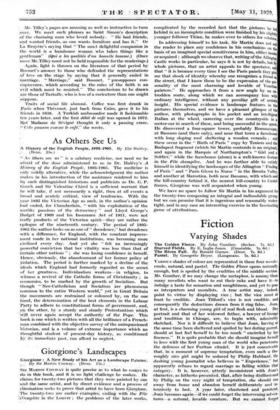As Others See Us
A History of the English People, 1895-1905. By Elie Haldvy. (Henn. 25s.)
As ithers see us " is a salutary medicine, nor need we be afraid of the dose administered to us in Dr. Halevy's A yistory of the English People, 1895-1905. The medicine is only mildly alterative, while the acknowledgment the author makes in his introduction of the assistance rendered to him by such distinguished historians and publicists as Dr. G. P. Gooch and Sir Valentine Chiral is a sufficient warrant that he will take, if not -necessarily a right, then at all events a broad and acutely critical, view of tendencies. With the year 1895 the Victorian Age as such, in the author's opinion ]cad ended, for Chamberlain, " with his exploitation of the warlike passions of the democracy " and Lloyd George's Budget of 1909 and his Insurance Act of 1911, were not really products of the Victorian spirit—they are rather the epilogue of the nineteenth century. The period of 1895- 1905 the author looks on as one of " decadence," but decadence -with a difference, for England, with the constant improve- ment made in her national institutions, was becoming more civilized every day. And yet she " felt an increasingly .powerful conviction that her vitality was less than that of certain other nations " ; she was losing confidence in herself. Hence, obviously, the abandonment of her former policy of isolation. The period is further marked by a decline of the ideals which England had formerly regarded as the secret of her greatness. Individualism weakens—in religion, to witness a revival of the Catholic forms of Christianity ; in economics, to be marked by the growth of ,Socialism. But though " Neo-C,atholicism and Socialism are phenoinena common to the entire Western world," yet in Great Britain the movements are restrained or coloured by, on the one Vand, the determination of the best elements in the Labour 'Party to adhere to constitutional forms of government, and, pa the other, by a sturdy and steady Protestantism which All never again accept the authority of the, Pope. This book is one which is written with all the brilliance of a French- man combined with the objective survey of the unimpassioned 'historian, and is a volume of extreme importance which no thoughtful student of present-day history, as conditioned by its immediate past, can afford to neglect.










































 Previous page
Previous page